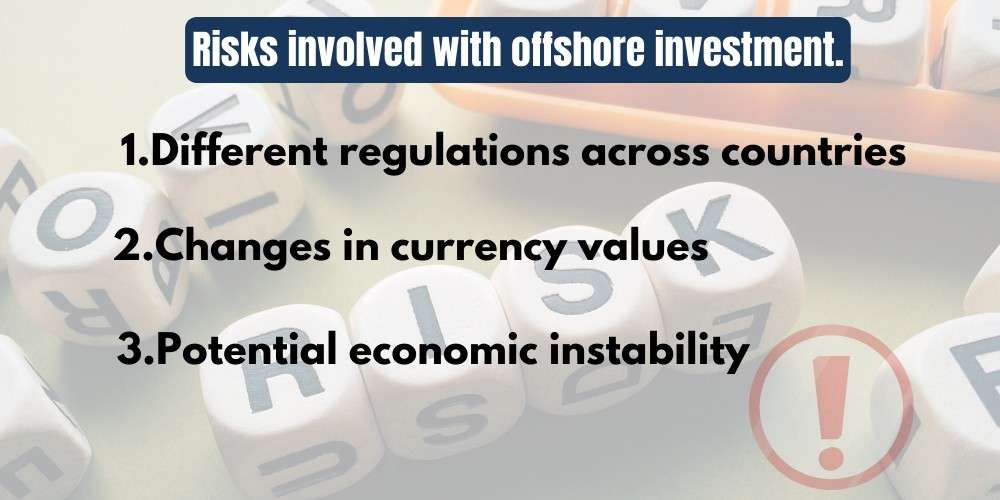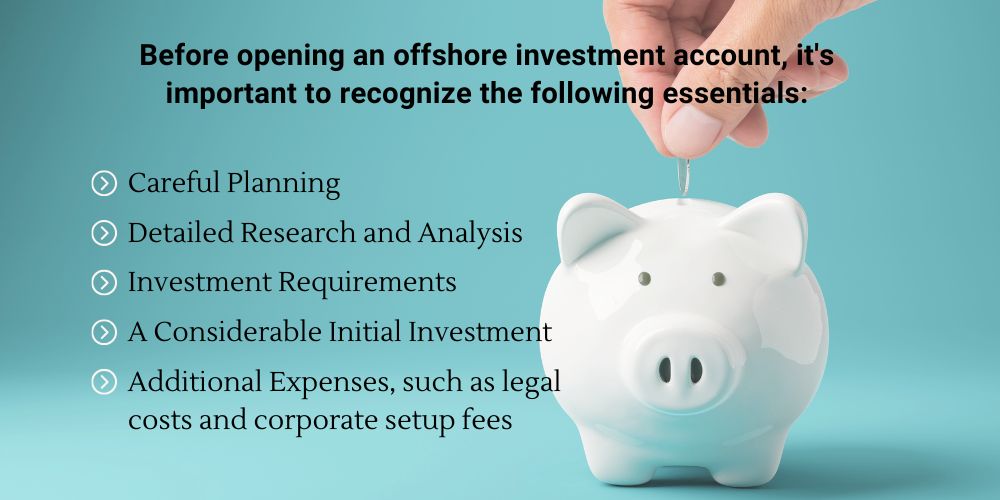Offshore investments refer to the practice of keeping or managing funds, assets, or investments outside one’s home country. This strategy is often used by individuals and corporations to benefit from favorable tax environments, diversify assets, or access international financial markets.
What is Offshore Investment?
Offshore investment involves placing money in financial assets or business ventures in a foreign country to achieve various financial objectives, such as asset protection, tax minimization, and access to broader investment options. Offshore accounts or investments can be held in various forms, such as:
- Offshore bank accounts
- Offshore mutual funds
- Offshore hedge funds
- Offshore real estate investments
- Offshore trusts or companies
Offshore financial centers (OFCs) like the Cayman Islands, Singapore, Switzerland, and the British Virgin Islands are popular destinations for offshore investment due to their favorable regulatory frameworks, lower taxes, and confidentiality laws.
Benefits of Offshore Investment
Tax Reduction: Offshore investment structures can significantly lower the tax burden, especially for high-net-worth individuals and multinational corporations.
Diversification: Offshore investing provides exposure to a wide range of asset classes and international markets, helping to balance risk and return in a portfolio.
Confidentiality: Offshore jurisdictions often provide legal frameworks that protect the privacy of investors, reducing the risk of unwanted exposure or attention.
Asset Protection: By moving assets offshore, investors can shield their wealth from potential creditors, lawsuits, or economic and political risks in their home countries.
Currency Hedging: Offshore accounts in multiple currencies help hedge against currency fluctuations, protecting the value of investments and savings.
Estate Planning: Offshore trusts and foundations offer opportunities for effective estate planning, allowing individuals to manage the distribution of wealth across generations while minimizing taxes.
Types of Offshore Investments
- Offshore bank accounts allow individuals or corporations to hold foreign currencies, which can hedge against local currency depreciation or inflation.
- These accounts offer higher interest rates in certain jurisdictions and provide global access to funds.
- Offshore mutual funds pool together money from multiple investors to invest in a wide range of global financial instruments, such as stocks, bonds, and real estate.
- They are often domiciled in countries with favorable tax laws, reducing the tax burden on investment returns.
- Hedge funds use a wide range of investment strategies to earn returns for investors. Offshore hedge funds benefit from fewer regulatory constraints and tax incentives, making them a popular option for high-net-worth investors.
- Investing in foreign real estate is another form of offshore investment. It can be lucrative, particularly in growing markets, and can help diversify investment portfolios.
- Offshore real estate also offers opportunities for capital appreciation, rental income, and access to residency or citizenship programs.
- Offshore trusts are legal entities set up to hold assets for the benefit of individuals. They are used to manage wealth, minimize taxes, and ensure asset protection.
- Offshore companies are corporations formed in foreign jurisdictions that offer tax benefits, anonymity, and favorable business laws.
Popular Offshore Investment Jurisdictions
Cayman Islands: Known for no direct taxes on income or gains, the Cayman Islands is a favored destination for offshore hedge funds, mutual funds, and trusts.
Switzerland: Famous for its banking privacy and stability, Switzerland offers offshore banking and investment opportunities with high levels of confidentiality and a robust legal system.
British Virgin Islands (BVI): The BVI is popular for setting up offshore companies due to its favorable regulatory environment, tax neutrality, and confidentiality.
Singapore: A major financial hub in Asia, Singapore offers tax incentives, robust regulatory frameworks, and access to Southeast Asian investment opportunities.
Hong Kong: With no capital gains tax and access to the vast Chinese market, Hong Kong is a popular jurisdiction for offshore investments, especially for corporations and high-net-worth individuals.
Luxembourg: Known for its sophisticated investment structures, Luxembourg offers offshore mutual funds, hedge funds, and corporate tax planning services.
Risks of Offshore Investment
Legal and Regulatory Risks: Offshore investments may be subject to complex regulations in both the investor’s home country and the offshore jurisdiction, which can pose compliance challenges.
Tax Evasion Concerns: Offshore investments have been associated with tax evasion. Individuals must ensure compliance with tax laws to avoid legal consequences.
Political and Economic Instability: Some offshore jurisdictions may be vulnerable to political instability, changing laws, or economic downturns, which could impact the safety of investments.
Currency Risk: Investing in foreign currencies exposes investors to the risk of exchange rate fluctuations, which can affect the value of returns.
Transparency Issues: Some offshore financial centers have limited transparency, which can lead to difficulties in verifying the legitimacy of offshore investment opportunities.
Reputation Risk: In some countries, offshore investments are often scrutinized due to concerns about money laundering or tax evasion, potentially harming an investor’s reputation.
How to Make Offshore Investments
Choose the Right Jurisdiction: Research the tax laws, political stability, and financial regulations of various offshore jurisdictions to select one that meets your needs.
Determine Investment Goals: Clarify your objectives, whether they are tax reduction, asset protection, wealth diversification, or estate planning.
Open an Offshore Bank Account: Many offshore investments start with opening a bank account in an offshore financial center. These accounts can be used for everyday banking, investment, and holding foreign currencies.
Select the Right Investment Vehicle: Decide whether to invest in offshore mutual funds, real estate, hedge funds, or create a trust or offshore company.
Ensure Compliance with Local Laws: Understand and comply with tax and legal obligations in both your home country and the offshore jurisdiction. Seek professional advice to avoid potential legal issues.
Monitor Investments Regularly: Offshore investments require ongoing monitoring to ensure they continue to meet your financial objectives and adapt to any changes in laws or market conditions.
Conclusion
Offshore investments offer numerous financial advantages such as tax efficiency, asset protection, and access to global markets. However, they also come with certain risks, including legal challenges, regulatory issues, and reputational concerns. With proper research, professional advice, and a clear understanding of your financial goals, offshore investments can play a valuable role in wealth management strategies for individuals and businesses.
Why Choose Globalvisanet?
Globalvisanet Overseas Careers stands out as our consultant , and our track record speaks for itself. We’ve successfully served our customers.
Explore the World with Globalvisanet:
- Visit Visa: Whether for leisure or business, embark on global travel with Globalvisanet.
- Study Visa: Unlock opportunities to study in globally recognized universities.
- Work Visa: Settle in the world’s best cities and pursue your career ambitions.
- Immigration: Your comprehensive solution for all visa and immigration requirements.
- Permanent Residence: Attain the status of Permanent Resident and enjoy exclusive benefits.
Tailored Services for Your Success:
- Profile Evaluation: We analyze your unique profile history, aligning it with visa eligibility criteria, and provide guidance on the appropriate visas to pursue.
- Resume Writing: Craft a standout resume tailored to meet the expectations of immigration authorities.
- Document Procurement: Assist in gathering essential documents required for visa applications.
- Professional Guidance: From interview training to language courses and crafting impactful resumes and cover letters, we offer comprehensive support.
- Dedicated Case Officer: Enjoy personalized assistance and a singular point of contact throughout the entire process.
- Post-Landing Services: Our support extends beyond visa approval, helping you settle comfortably in your new country with customized post-landing services.
Experience a seamless journey for all your visa needs with Globalvisanet – from profile evaluation and document preparation to post-visa settlement services. If you have questions about filing the AIPP application, reach out to us immediately. We are here to assist you in every possible way.







